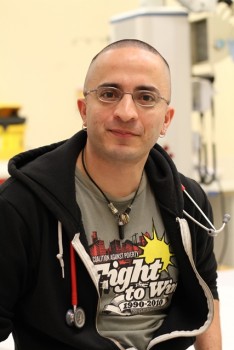Decolonizing Health Care: Confronting Medical Colonialism against Indigenous Children
Posted on July 14, 2020 by the Canadian Paediatric Society | Permalink
Topic(s): Advocacy, Professional education
By Samir Shaheen-Hussain MD CM, FRCPC
The #aHand2Hold campaign, launched on January 24, 2018, sought to end a long-standing practice that systematically prevented caregivers and parents from accompanying their children during emergency medical evacuation (medevac) airlifts in Quebec. Created by the provincial government in the 1980s, Évacuations aéromédicales du Québec (ÉVAQ) instituted this non-accompaniment rule at its inception, when similar practices were likely standard across the country. Over the years, thousands of children were transferred alone to urban pediatric centres for emergency medical care far away from home. The rule applied to all children living in rural and remote areas in Quebec who required ÉVAQ’s flying hospital service. However, Indigenous children, particularly those from northern communities, were disproportionately impacted because of a confluence of social determinants of health – including imposed food insecurity, poverty, overcrowded housing, and inadequate healthcare services – that put them at higher risk of requiring emergency medevac airlifts. ÉVAQ healthcare personnel were strangers to these children, most of whom had never been on a plane. The younger ones often didn’t speak English or French. Upon arrival at the emergency department of the Montreal Children’s Hospital (MCH), for example, Eeyou (Cree) and Inuit children would be poked and prodded by other unfamiliar faces. In some cases, a family member was only able to join a hospitalized child days later because of factors completely beyond their control.
The Latin maxim primum non nocere, often adapted as “above all, do no harm,” serves as a prime directive in health care. However, as a paediatrician working in a medical system that condoned this family separation, wasn’t I complicit in the trauma it caused? A former MCH trainee, expressing her support for the #aHand2Hold campaign, wrote: “I can’t even recall all the times in my residency that I was in a situation where this policy affected a child I was taking care of. We knew it was the rule, we knew it was awful, and yet we just kept going.”
The non-accompaniment practice somehow became normalized for us over time, but inflicting wholly avoidable physical, emotional, and psychological trauma on children should never be normal. In contrast, paediatric hospitals in other provinces and territories across the country confirmed that children benefited from having a loved one present during emergency transfers for years.
The #aHand2Hold campaign’s core demand was very simple: a child- and family-centered policy for all medevac airlifts in Quebec. It also called into question the commonly held belief that the medical establishment is culturally neutral and inherently benevolent. Ultimately, the campaign exposed how the persistence of ÉVAQ’s non-accompaniment rule was part of a long-standing and ongoing history of medical colonialism, rooted in systemic racism. Indeed, consider these crimes committed by medical practitioners and health care systems against Indigenous children across the country over the last century and a half: fomented community-wide smallpox epidemics; avoidable tuberculosis deaths in residential schools; experiments and abuse in residential schools, Indian Hospitals, reserves, and communities; forced sterilization; abduction and disappearances. Physicians have often led the charge. For instance, the late Dr. Frederick Tisdall, a paediatrician at Toronto’s Hospital for Sick Children, a former Canadian Paediatric Society president, and co-inventor of Pablum, was actively involved in egregious nutritional experiments conducted on Indigenous adults and children in the 1940s.
ÉVAQ’s now-defunct non-accompaniment rule was certainly traumatizing for all children, but the suffering of Indigenous families and communities was compounded because of their historical experience of colonial trauma. Separating families became an example of medical colonialism when the long-standing calls to end the practice—coming from northern Indigenous communities themselves—were ignored by successive governments. Indeed, every time ÉVAQ prevented a caregiver from accompanying their child on a medevac airlift, it was another missed opportunity to right a historical wrong. If Indigenous children can’t be treated equitably and with dignity when it comes to health care, how will governments ever redress injustices imposed on Indigenous communities more broadly to this day?
The COVID-19 pandemic has exposed and worsened the fault lines of social injustices on a global scale, underscoring the urgency with which we, as a society, have to build a new world if we want humanity to survive and if we want to live our lives with meaning. A new world where emphasizing cooperation, mutual aid, and solidarity, being empathetic, respecting human dignity, and living in harmony with the environment are core values. Decolonization efforts here in Canada are a path to that world. Given the medical violence that has been inflicted on Indigenous children, we, as pediatricians, have a pivotal role to play in this process. An important first step would be to confront historical and contemporary forms of medical colonialism and systemic racism by putting an end to the medical culture that enables them. Only by decolonizing paediatric health care can we truly prioritize the health, well-being, dignity, and lives of Indigenous children, and their communities.
Samir Shaheen-Hussain is a paediatric emergency physician and assistant professor in the Faculty of Medicine at McGill University. He would like to acknowledge Elizabeth Moreau, Nazila Bettache, Stef Gude, and Radha Jetty for their contributions to this piece. His forthcoming book, Fighting for a Hand to Hold: Confronting Medical Colonialism against Indigenous Children in Canada (foreword by Cindy Blackstock and afterword by Katsi’tsakwas Ellen Gabriel) will be published by McGill-Queen’s University Press in September 2020; the French translation will be published by Lux Éditeur in January 2021.
Photo by Sandra Sciangula, courtesy of the Montreal Children's Hospital
Copyright
The Canadian Paediatric Society holds copyright on all information we publish on this blog. For complete details, read our Copyright Policy.
Disclaimer
The information on this blog should not be used as a substitute for medical care and advice. The views of blog writers do not necessarily represent the views of the Canadian Paediatric Society.
Last updated: Aug 10, 2020

